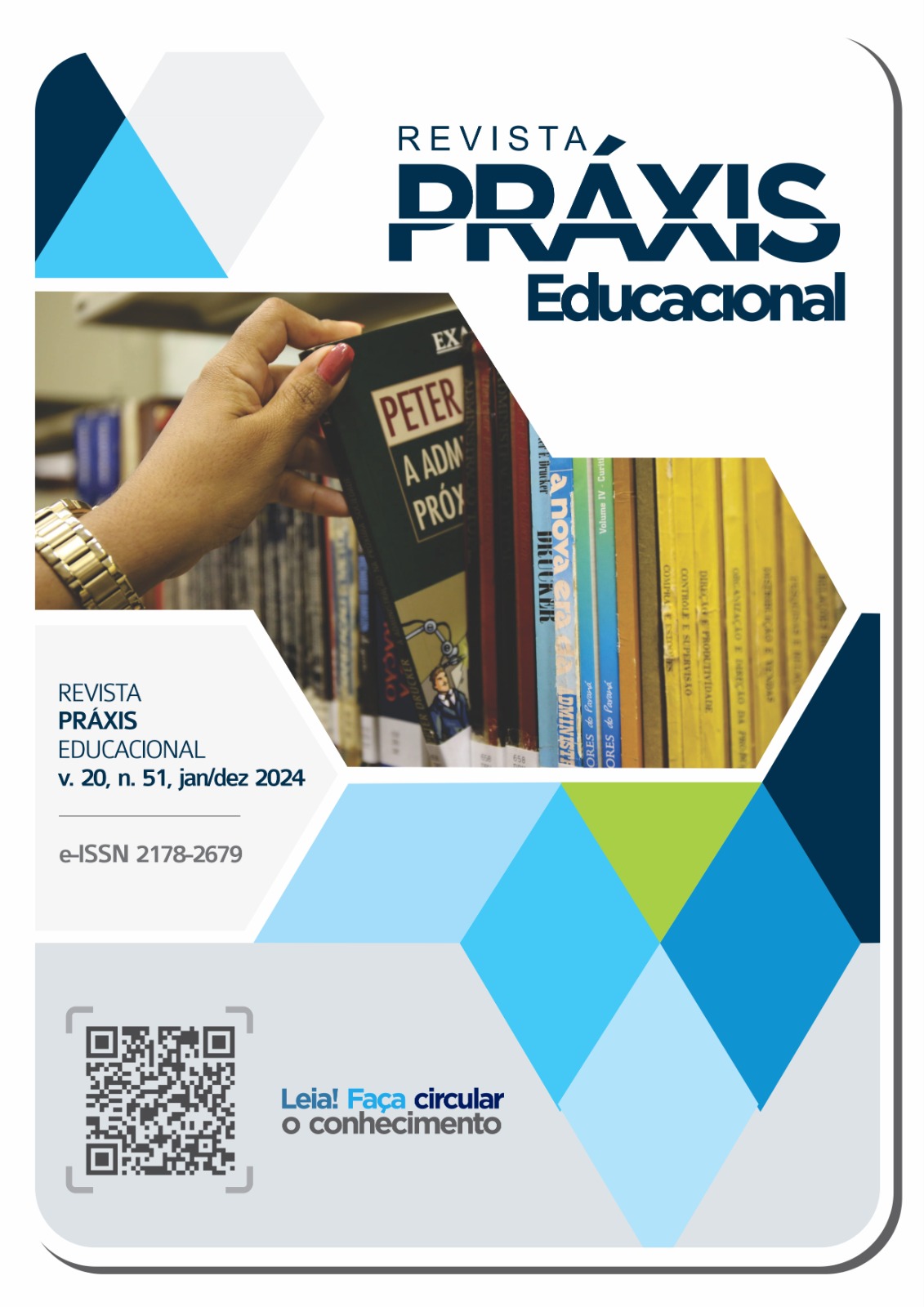The place of teachers in permanent training: analysis and propositions
DOI:
https://doi.org/10.22481/praxisedu.v20i51.12737Keywords:
ongoing formation, pedagogical contexto, pedagogical practiceAbstract
This text addresses the place of teachers in ongoing training, aiming to provoke debate about the condition of passivity to which these professionals are subjected in training processes in which they are reduced to mere replicators and doers of what is presented to them as a solution to the everyday problems of their practices. Supported by the concepts of permanent training in schools (Imbernón, 2009, 2016), reflective teachers (Pimenta, 2012) and teaching knowledge, from the perspective of Tardif (2014) and Freire (2020a), we analyzed data from a questionnaire answered by seven teachers from the Initial Years of Elementary School at a public school in the municipality of Vertente do Lério-PE, about their experiences with permanent training. The results showed the interviewees' dissatisfaction with the training model they experienced, confirming the urgency of a new look at these trainings.
Downloads
Metrics
References
BARDIN, Laurence. Análise de Conteúdo. São Paulo: Edições 70, 1977.
BRASIL. Referenciais para a formação de professores. Brasília, DF: MEC/SEF [1999]. Disponível em: http://portal.mec.gov.br/index.php?option=com_docman&view=download&alias=48631-reformprof1&category_slug=documentos-pdf&Itemid=30192 Acesso em: 12 dez. 2019.
FREIRE, Paulo. Pedagogia da autonomia: saberes necessários à prática educativa. 56 ed. Rio de Janeiro/São Paulo: Paz e Terra, 2020a.
FREIRE, Paulo. Pedagogia do oprimido. 73.ed. Rio de Janeiro: Paz e Terra, 2020b.
GADOTTI, Moacir. A escola dos meus sonhos. São Paulo: Instituto Paulo Freire, 2019.
IMBERNÓN, Francisco. Formação permanente do professorado: novas tendências. São Paulo: Cortez, 2009.
IMBERNÓN, Francisco. Formação docente e profissional: formar-se para a mudança e a incerteza. 8ª ed. São Paulo: Cortez, 2010.
IMBERNÓN, Francisco. Qualidade do ensino e formação do professorado: uma mudança necessária. São Paulo: Cortez, 2016.
LIBÂNEO, José Carlos. Adeus professor, adeus professora? Novas exigências educacionais para a profissão docente. 13ª ed. São Paulo: Cortez, 2011.
LUCKESI, Carlos Cipriano. O papel da didática na formação do educador. In: CAUDAU, Vera Maria (org.). A didática em questão. 33.ed. Petrópolis: Vozes, 2012. p.25-34.
MORIN, Edgar. Introdução ao pensamento complexo. 5ª ed. Porto Alegre: Sulina, 2015.
MORIN, Edgar. A cabeça bem-feita: repensar a reforma, reformar o pensamento. Rio de Janeiro: Bertrand Brasil, 2014.
NÓVOA, António. Firmar a posição como professor, afirmar a profissão docente. Cadernos de Pesquisa, v.47, n.166, p.1106-1103, out./dez. 2007. Disponível em: https://www.scielo.br/j/cp/a/WYkPDBFzMzrvnbsbYjmvCbd/?format=pdf&lang=pt Acesso em: 15 set. 2023.
PERRENOUD, Philipe. O trabalho sobre o habitus na formação de professores: análise das práticas e tomada de consciência. In: PAQUAY, Léopold; PERRENOUD, Philippe. Formando Professores Profissionais: Quais estratégias? Quais competências? Porto Alegre: Artmed, 2001.p.161-184.
PIMENTA, Selma Garrido. Professor reflexivo: construindo uma crítica. In: PIMENTA, Selma Garrido; GHEDIN, Evandro (org.). Professor Reflexivo no Brasil: gênese e crítica de um conceito. São Paulo: Cortez, 2012.
PRADNOV, Cleber Cristiano; FREITAS, Ernani Cesar de. Metodologia do trabalho científico: métodos e técnicas de pesquisa e do trabalho acadêmico. 2. ed. Novo Hamburgo: Feevale, 2013.
SILVA, Jansen Felipe; ALMEIDA, Lucinalda Andrade Ataíde. Política Permanente de Formação Continuada de Professores: entraves e possibilidades. In: FERREIRA, Andréa Tereza Brito; CRUZ, Shirleide Pereira (org.). Formação Continuada de Professores: reflexões sobre a prática. Recife: Editora Universitária da UFPE, 2010. p. 11-33.
TARDIF, Maurice. Saberes docentes e formação profissional. 17ª. ed. Petrópolis, RJ: Vozes, 2014.
Downloads
Published
How to Cite
Issue
Section
License
Copyright (c) 2024 Práxis Educacional

This work is licensed under a Creative Commons Attribution 4.0 International License.
You are free to:
Share - copy and redistribute the material in any medium or format; Adapt - remix, transform, and build from the material for any purpose, even commercially. This license is acceptable for Free Cultural Works. The licensor cannot revoke these freedoms as long as you follow the terms of the license.
Under the following terms:
Attribution - You must appropriately give credit, provide a link to the license, and indicate if any changes have been made. You may do so in any reasonable way, but not in a way that suggests that you or your use is endorsed by the licensor.
There are no additional restrictions - You cannot apply legal terms or technological measures that legally restrict others to make any use permitted by the license.










